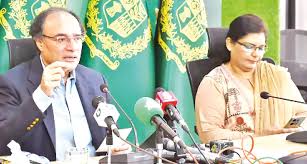China to support Pakistan securing approval from IMF Board

Liaquat Ali
Islamabad: Minister for Finance and Revenue Senator Muhammad Aurangzeb Sunday said that the Chinese Government has commended Pakistan’s negotiation with the International Monetary Fund (IMF) and assured to play its role in securing approval from the Fund’s board.
Addressing a press conference, the minister said that he along with the Minister for Energy Sardar Awais Ahmad Khan Leghari had visited China and held constructive meetings with the Chinese authorities including the Finance Minister of China and the President Bank of China.
The minister further informed that he also visited China along with the energy minister at the start of last month (June) and held discussions on different aspects of bilateral trade and economic cooperation including local energy requirements and launching of Panda bonds in the Chinese markets.
During the recent visit to China re-profiling of energy sector loans was also discussed, he said adding that the conversion of energy plants into coal and other aspects for affordable energy generation were also discussed during different high-level meetings.
He said that the Chinese authorities acknowledged and ensured that our issues are registered with the right forum adding that the process has to be followed to take them forward. He said they also wanted to help the country in terms of re-profiling.
He added that this would be done through the context of a memorandum of understandings or various working groups which would be formed to take the matters forward during the days to come.
Senator Muhammad Aurangzeb said that China is ranked among the world’s biggest capital markets and Pakistan plans to issue these bonds to diversify its funding sources and strengthen its foreign exchange reserves by attracting Chinese investors.
He said that Prime Minister Muhammad Shehbaz Sharif had also discussed the local energy requirements with the Chinese top leadership urging them to evolve a mechanism for extending their support to overcome power supply needs for the socio-economic development of the country.
Regarding the IMF programme, the finance minister further informed that the discussion with the Fund had remained positive and constructive, adding that all the set benchmarks were achieved.
He said that China, Saudi Arabia and United Arab Emirates have always extended their supports for Pakistan for its economic growth and development.
Meanwhile, the minister said that the incumbent government was also taking several measures in domestic front for turning around the local economy, adding that special emphasis was paid on the taxation side by bringing the non-taxed sectors into the tax net for broadening the tax base.
He said that to realize the 13 percent tax to GDP ratio, it was prerequisite to take measures for the simplification of tax returns and facilitating the tax pairs to achieve full compliance, adding that the government has launched Tajir Dost Scheme for voluntary tax compliance that offers benefits to unregistered businesses.
He said that the government was determined to introduce the same facilities for other sectors to simplify the tax return process.
He said that the expansion of the tax to other sectors like retailers, real estate, builders and developers and agriculture would help to create a space to provide relief and reduce the burden from the existing tax pairs, adding that the government was fully determined to bring the un-taxed and under-taxed sectors into the tax net.
He said that the Prime Minister himself was monitoring the tax sector reforms and digitization of the tax collecting system to plug the leakages as well as identifying the under-taxed or un-taxed to enhance revenue collection in the country.
Through digital data analytics, the Federal Board of Revenue has identified about 4.9 million income tax non-filers, adding that those were pointed out on the basis of basic data regarding traveling abroad, a number of vehicles and others, he added.
The minister said that the government was also focusing on right-sizing the different ministries and divisions to minimize its expenditure and create more fiscal space for social sector development, adding that in the first phase work on the right-sizing of five ministries was in progress.
He said that as soon as the progress would be made on the right sizing of these institutions, it would be implemented as well and shared with the media.
The finance minister admitted the fact that inflation went up after the GST measures were introduced in the Federal Budget for the Fiscal Year 2-24-25, however, he said that some elements were taking undue benefit and artificially sparking the prices of essential commodities.
The minister warned that such elements would be dealt with iron hands and directed the provincial government to enhance their vigilance through the price monitoring committees and ensure the fair prices of these commodities across the country to facilitate the common man in the country.





